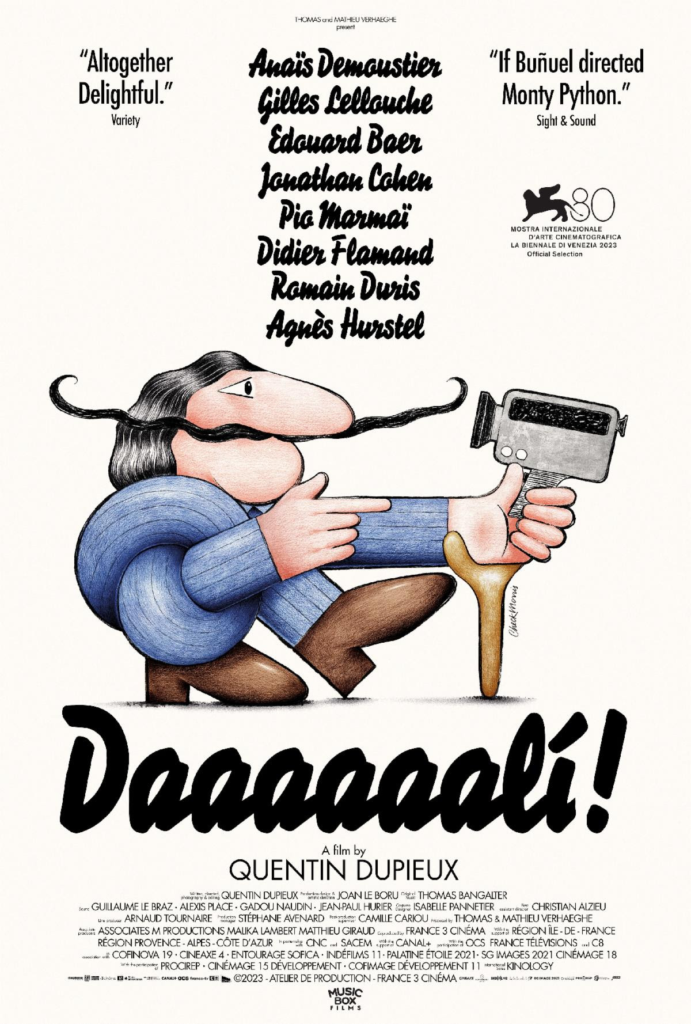Daaaaaalí! Christian Review

Quentin Dupieux’s Daaaaaali! is something else. Imagine a film that doesn’t want you to overthink things but instead nudges you toward laughter and absurdity, all while parading the chaotic brilliance of Salvador Dalí, but without ever fully “capturing” him. Because really, how do you capture Dalí? He’s more like a feeling, an idea—a wild, surreal force of nature that no script could ever tame. In a way, that’s exactly Dupieux’s point. He doesn’t try to frame Dalí in a neat little box. Instead, he serves up a visual feast that plays around with the concepts of art, genius, and human vanity, all wrapped in a package that’s as daffy as it is delightful.
The Lighter Side of Madness
Now, the first thing you’ve got to understand about Daaaaaali! is that it’s not some heavy, thought-provoking meditation on the meaning of life. No, Dupieux doesn’t want to drag us into a philosophical abyss. The film’s real goal? To make you chuckle at the craziness of it all. It’s packed with absurdity, with actors taking turns hamming it up as Salvador Dalí, and scenes that veer more toward the ridiculous than the reflective. For some, this might be frustrating. After all, Dalí was no ordinary man, and his work—though wild and surreal—often toyed with deeper themes of life, death, and reality. But here, Dupieux focuses on the playful side of things, with a tone that’s less existential and more “let’s just have a laugh.”
As a Christian viewer, this could go either way for you. On one hand, there’s nothing wrong with a good laugh at the absurdities of life. Humor can be a gift, a way to shake off the weight of the world and see the joy in the bizarre. Think of Proverbs 17:22, where it says, “A cheerful heart is good medicine, but a crushed spirit dries up the bones.” Daaaaaali! gives you a dose of that cheerful heart—if you’re in the mood for it.
But for some, the film’s lightheartedness might be a double-edged sword. You could find yourself craving a bit more depth, especially since it hints at profound ideas but never fully dives in. It’s like when someone cracks a joke at a funeral—not entirely inappropriate, but you can’t help but feel something deeper was left unsaid.
Art, Mortality, and the Fleeting Fame
Let’s talk about one of the few weightier themes that does sneak its way into Daaaaaali!: mortality. It’s not hammered in with heavy dialogue or dramatic monologues, but it’s there, lurking just beneath the surface. Dalí himself, in all his eccentricity and genius, was always aware of his own mortality. In the film, we get glimpses of this, even though the script doesn’t dwell on it. There are moments when you see Dalí grappling with his sense of time running out, though it’s often wrapped in layers of silliness and surrealism.
From a Christian perspective, this fleeting acknowledgment of death opens up a bigger conversation. Dalí, for all his genius, was still just a man. And like all men, he would eventually face the reality that this life is temporary. Ecclesiastes 1:2 reminds us of the vanity of life apart from God: “Meaningless! Meaningless! Everything is meaningless!” Dalí, like many great artists, sought to immortalize himself through his work, through fame, through an image that would outlive his physical body. Yet, as Daaaaaali! hints at, even this self-promotion, this effort to transcend mortality, is a kind of trickery. And eventually, the trick gets old. It grows tiresome.
That’s one of the film’s more interesting insights. Dalí’s genius is undeniable, but what does it amount to in the end? A legacy? Sure. But it also serves as a reminder of how much we, as humans, can get caught up in building little empires for ourselves. And for what? To leave behind some kind of proof that we existed? Christianity offers a counter to this obsession with self-immortalization. We are not remembered by our works or our fame, but by our relationship with Christ, who conquered death so that we wouldn’t have to try.
Absurdity, Creativity, and Contradiction
The film’s real fun comes from its contradictions. Beautiful and grotesque, profound and silly—Dupieux throws all of it at us without warning. And for Christians, this can feel familiar. We live in a world of contradictions, don’t we? We see beauty in creation, but we also see brokenness. We laugh and cry, sometimes within the same breath. And while Daaaaaali! isn’t necessarily out to make a theological statement, it taps into this reality in its own whimsical way.
One moment you’re watching a Dalí stand-in vamp around the screen, larger than life, a genius basking in his own strangeness. The next moment, you’re hit with a reminder of how all of this—fame, art, and even Dalí himself—has an expiration date. And this isn’t just Dalí’s problem. It’s all of ours. No matter how much we create, how much we laugh, or how much we indulge in the surreal, we’re all moving toward the same inevitable end. But again, Dupieux doesn’t linger here for long. He’s too busy jumping to the next absurd set piece, keeping things light enough that we never really feel the weight of it all.
The Trickiness of Genius
At the heart of Daaaaaali! is a question about genius and how we respond to it. Dalí, both in real life and as portrayed in the film, was a man who embraced contradictions. He knew how to manipulate his own image, how to draw attention to himself, how to make you question whether there was some deeper meaning to his antics—or if he was just messing with you. Dupieux seems to enjoy this trickery, but it’s not without its downsides.
As the film progresses, the constant toying with Dalí’s genius can start to feel exhausting. It’s like watching a magician perform the same trick over and over again. The first time, you’re impressed. By the fifth or sixth time, the magic wears off. And maybe that’s Dupieux’s point: genius, when wielded as a tool for self-promotion, can wear thin.
For Christians, this is where the film’s playful critique of Dalí’s self-centeredness hits closest to home. We are constantly warned against the dangers of pride and the emptiness of glorifying ourselves. Proverbs 16:18 reminds us that “Pride goes before destruction, a haughty spirit before a fall.” Dalí’s flamboyance is fun to watch, but in the end, it serves as a subtle cautionary tale about the hollowness of building a legacy around oneself.
A Light, Fleeting Experience
So where does all this leave us? Daaaaaali! is a film that doesn’t want to be taken too seriously, but if you look closely, there are threads of meaning woven into its playful madness. It’s a movie for those who enjoy absurd humor and aren’t too concerned with finding a clear message or moral. For Christian viewers, there’s enough here to spark reflection, particularly around themes of mortality, vanity, and the contradictions of life.
But if you’re hoping for a deeper spiritual takeaway, you might walk away feeling a bit underwhelmed. Dupieux’s focus is on the fun, the absurd, and the ridiculous, and he doesn’t want to distract you from that with too much heaviness. In the end, Daaaaaali! is a reminder that while life is filled with contradictions and fleeting fame, it’s also worth enjoying the ride—even if the ride itself doesn’t always make sense.
Final Rating: 6/10.





